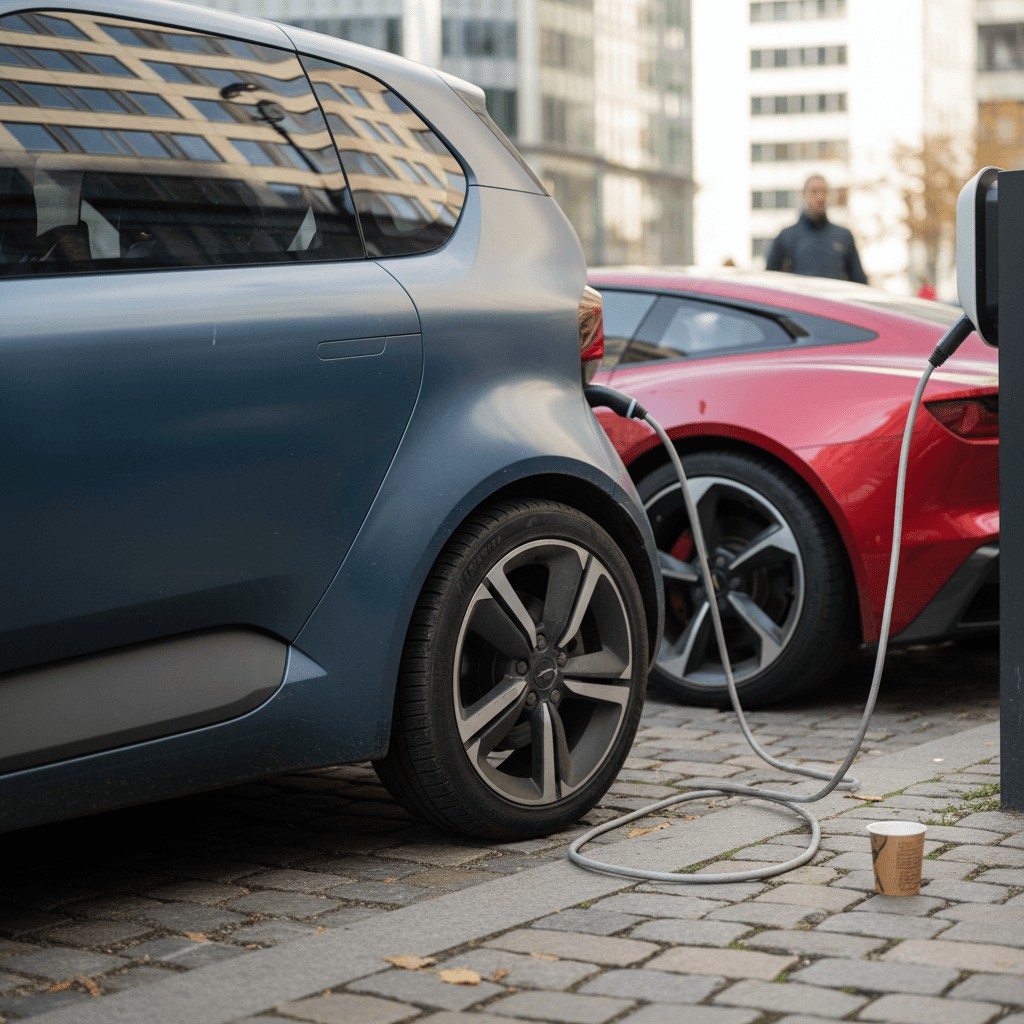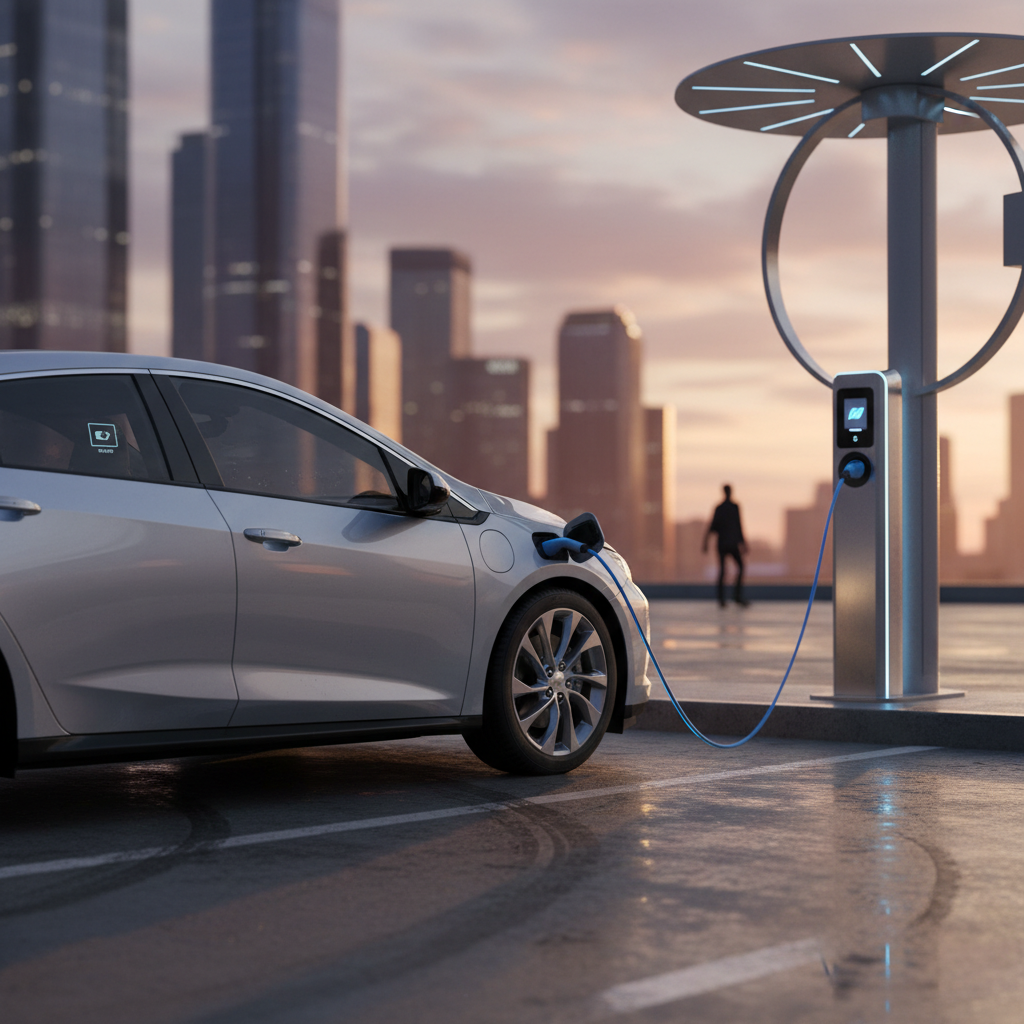If you’re trying to make sense of EV cost comparison headlines in 2025, it can feel like whiplash. Some studies say electric vehicles are cheaper to own than gas cars, others say they still cost more. The truth is that the answer depends heavily on how you drive, what you buy, and whether you look new or used. This guide breaks the question down line by line so you can plug in your own numbers and see what actually pencils out.
EV vs gas: it’s not just about fuel
Why EV cost comparison matters in 2025
Key 2025 cost signals for EVs vs gas
Two big forces are colliding in today’s EV cost comparison. On one side, upfront EV prices and insurance costs are still higher than comparable gas cars, especially for brand‑new models. On the other side, fuel and maintenance costs heavily favor EVs, and a growing used EV market is bringing purchase prices down. That’s why you’ll see some analyses showing EVs slightly more expensive overall and others showing them slightly cheaper: change the assumptions, and the outcome moves.
Beware outdated EV cost claims
How to compare EV vs gas total cost of ownership
To make a fair EV cost comparison, treat your car like a five‑year project instead of a one‑time purchase. Analysts call this total cost of ownership (TCO). The idea is simple: add up everything you’ll spend and subtract what you’ll get back when you sell or trade the car.
- Upfront costs: purchase price, taxes, dealer fees, home charging installation.
- Fuel: gasoline or diesel for gas cars; electricity for EVs (home, workplace, public charging).
- Maintenance & repairs: oil changes, brakes, fluids and exhaust for gas; tires, occasional brakes and cabin filters for EVs.
- Insurance and registration: including any state EV surcharges or discounts.
- Depreciation: how much value you lose when you sell or trade the vehicle.
- Incentives: federal and state tax credits, utility rebates, HOV lane perks, free charging and other benefits.
Use the same assumptions for both cars
Upfront price: EV vs gas and the role of used EVs
New electric vehicles still tend to cost more than comparable gas cars on the sticker, especially for popular crossovers and trucks. Even as battery prices have fallen, many EVs pack in more technology and performance, which keeps MSRPs elevated. Meanwhile, used EVs have become the sweet spot: they skip the early‑adopter price premium but still deliver the low running costs that make EV ownership attractive.
How upfront costs differ: new EV, used EV, new gas
Think in terms of the monthly budget, not just sticker price.
New gas car
Pros: Lowest upfront price for many segments, broad selection, plenty of dealer discounts.
Cons: Higher fuel and maintenance costs; may age quickly if regulations or fuel prices change.
New EV
Pros: Smooth, quiet drive; very low fuel and maintenance costs; access to latest tech and safety features.
Cons: Higher MSRP, potentially higher insurance and depreciation; may require home charger installation.
Used EV
Pros: Lower purchase price, many models under $25k; low running costs; incentives may still apply for some used EVs.
Cons: Battery health varies; range may be lower than new EVs; older tech and smaller charging networks on some models.
How Recharged helps on upfront price
Fuel costs: EV electricity vs gasoline
Fuel is where EVs typically shine. The math isn’t complicated: you’re comparing dollars per mile driven. For a rough national baseline in 2025, residential electricity averages in the mid‑teens per kWh, while gasoline hovers a little above $3 per gallon. Actual rates vary a lot by state, but the pattern is consistent: EVs usually use energy more efficiently than gas cars use fuel.
Illustrative fuel cost comparison (national averages, 2025)
Simplified example using typical efficiency figures and average U.S. energy prices. Your numbers will vary by vehicle, location and driving style.
| Vehicle type | Efficiency | Energy price assumption | Energy used per 1,000 miles | Fuel cost per 1,000 miles | Fuel cost per mile |
|---|---|---|---|---|---|
| Compact gas car | 32 mpg | $3.15 per gallon | 31.3 gallons | $98 | 9.8¢ |
| Midsize gas SUV | 26 mpg | $3.15 per gallon | 38.5 gallons | $121 | 12.1¢ |
| Efficient EV sedan | 3.5 mi/kWh | 17¢ per kWh | 285.7 kWh | $48.6 | 4.9¢ |
| Less efficient EV SUV | 2.7 mi/kWh | 17¢ per kWh | 370.4 kWh | $63 | 6.3¢ |
Electricity costs are rising, but per‑mile costs for EVs are still usually lower than for gas cars, especially if you charge mostly at home.
Lower electricity rates tilt the math further toward EVs
Home and workplace charging
- Cheapest option in most markets, especially with off‑peak or EV‑specific rates.
- Convenient "fill up while you sleep" experience.
- Costs are predictable, especially if you drive a consistent commute.
Public fast charging
- Great for road trips or apartment dwellers without home charging.
- Per‑kWh or per‑minute pricing often matches or exceeds gasoline on a per‑mile basis.
- Network membership plans, charging passes, or workplace DC fast charging can bring the cost down.

Maintenance and repairs: where EVs shine
Electric vehicles eliminate entire systems that drive maintenance costs on gas cars: no oil changes, no spark plugs, no timing belts, no exhaust, no catalytic converter. They still need tires, cabin air filters, brake fluid and occasional brake service, but the routine service checklist is shorter and simpler. Over five years, that usually turns into a meaningful gap in total spend.
Gas vs EV maintenance: common items
EVs have fewer moving parts and fewer fluids to service.
Typical gas car maintenance
- Oil and filter changes every 5–10k miles
- Spark plugs, ignition components
- Transmission service
- Exhaust system repairs
- More frequent brake jobs due to less regenerative braking
Typical EV maintenance
- Tires (EVs are heavier and torquier)
- Cabin air filter and possibly battery coolant checks
- Occasional brake service; pads last longer
- Software updates (often over‑the‑air)
- Unexpected repairs, but fewer wear items overall
Why this matters in your budget
Insurance, registration and EV-specific fees
Insurance is one of the under‑discussed pieces of EV cost comparison. New EVs often cost more to insure than comparable gas cars because of higher vehicle prices, expensive battery packs and limited repair networks in some regions. That said, as more shops get EV‑certified and more mainstream EVs hit the road, those gaps are gradually narrowing. Used EVs with lower values can see more normal insurance quotes, especially if they’re in less exotic segments.
Watch for state EV registration fees
Depreciation and resale value for EVs and gas cars
Depreciation, the value your vehicle loses over time, is usually the single largest cost of ownership, and EVs have had a volatile ride here. Rapid technology improvements, shifting incentives and changing consumer preferences have caused some EV models to depreciate faster than equivalent gas cars. Others, especially desirable long‑range or performance EVs, hold value comparatively well.
What drives EV depreciation?
- Battery health and remaining range: Buyers pay more for EVs with strong battery reports and realistic range.
- Charging experience: Models that support major fast‑charging networks and higher charging speeds tend to hold value better.
- Incentive changes: When new‑EV tax credits change, used values can move quickly.
How Recharged helps de‑risk depreciation
On the used side, a verified battery health report like the Recharged Score narrows the uncertainty that drags down EV resale values. If you buy a used EV with documented battery health and transparent pricing, you’re less exposed to the guesswork that has made early EV depreciation so choppy.
Why used EVs can be a depreciation “sweet spot”
Tax credits, incentives and charging perks
Incentives are the wild card in EV cost comparison. Federal tax credits, state rebates, utility discounts and even free public charging promotions can swing the math by thousands of dollars. The catch: these programs change frequently and often depend on your income, where you live and whether the car is new or used.
- Federal tax credits for qualifying new EVs and some used EVs, subject to income and vehicle‑price caps.
- State‑level rebates or tax credits, especially in EV‑friendly states.
- Utility rebates for home charger installation or special EV rate plans.
- Perks like HOV lane access or discounted tolls in some metros.
- Free or discounted workplace or retail charging programs.
Stack incentives with a realistic view
Sample 5-year EV cost comparison vs gas
Let’s walk through a simplified 5‑year EV cost comparison for a typical U.S. driver putting about 12,000 miles a year on the car. These numbers are illustrative, not a quote, but they show how the pieces fit together.
Illustrative 5-year cost comparison (12,000 miles/year)
Assumes mid‑trim compact SUV in both cases, financed, with average national fuel and electricity prices.
| Category (5 years) | Gas SUV (example) | Electric SUV (example) |
|---|---|---|
| Purchase, taxes & fees | $38,000 | $43,000 |
| Fuel / energy | $6,500 | $3,200 |
| Maintenance & repairs | $4,000 | $2,200 |
| Insurance & registration | $7,000 | $7,800 |
| Incentives & rebates | $0 | −$4,000 |
| Estimated depreciation | $14,000 | $17,000 |
| Estimated resale value after 5 years | $24,000 | $26,000 |
| Total 5‑year cost (net of resale) | ≈$45,500 | ≈$46,200 |
Even when total five‑year costs are similar, the EV shifts spending away from fuel and maintenance toward depreciation and insurance.
What this sample comparison tells you
When an EV saves you money, and when it doesn’t
Situations where EVs usually win (and where they struggle)
These patterns show up again and again in EV cost comparison studies.
EVs tend to save you money when…
- You drive more than 12,000–15,000 miles a year.
- You can charge mostly at home at reasonable electricity rates.
- You buy a used EV with good battery health or a competitively priced new model with incentives.
- Your state offers strong EV incentives or cheap off‑peak rates.
Gas or hybrid may be cheaper when…
- You drive fewer than 8,000 miles a year and keep cars a long time.
- You have no access to home or workplace charging and rely on expensive public fast chargers.
- Your local electricity rates are very high and gas is relatively cheap.
- You’re shopping heavily discounted gas models or basic trims that undercut EV pricing.
Don’t ignore your charging reality
How used EVs change the math
Used EVs are where the EV cost comparison is moving fastest. A few years of depreciation plus today’s more mature battery technology means you can often find a used EV with ample range at a price that competes directly with late‑model gas cars. The important caveat is that battery health and charging capability vary a lot by model and history.

That’s why independent battery diagnostics and transparent pricing matter. At Recharged, every used EV includes a Recharged Score battery health report so you know how the pack is performing, plus fair‑market pricing and EV‑specialist support. Together, those tools make it easier to treat a used EV like any other used car in your cost comparison instead of a gamble on battery degradation.
Checklist: calculate your own EV cost comparison
Step-by-step: build your personal EV vs gas cost model
1. Define your time horizon and miles
Decide how long you realistically keep cars (5 years is a good baseline) and estimate your annual mileage. A higher‑mileage driver benefits more from an efficient EV.
2. Pick comparable vehicles
Choose an EV and a gas model that actually match in size and features, a compact EV vs a full‑size SUV will give you misleading results.
3. Collect price and financing details
Get real quotes or listings for both vehicles, including taxes, fees and interest rates. For used EVs, make sure you also have a battery health report to factor into value.
4. Estimate fuel and electricity costs
Use your local gas price, your local electricity rate (including any EV plans), and the vehicles’ real‑world efficiency to estimate cost per mile. Multiply by your annual miles.
5. Add maintenance and insurance
Ask your mechanic or look up typical maintenance schedules for the gas car, and get insurance quotes for both vehicles with the same coverage limits and deductibles.
6. Account for incentives and fees
List the federal, state and utility incentives you actually qualify for, plus any extra EV registration fees or road‑use charges in your state.
7. Estimate resale value
Check current resale values for five‑year‑old versions of the vehicles you’re considering, or similar models. For EVs, adjust up or down based on battery health and brand demand.
8. Compare total five-year cost per mile
Add everything up for each vehicle, subtract estimated resale value, then divide by your total miles over the period. That gives you a clean cost‑per‑mile comparison.
EV cost comparison FAQ
Frequently asked questions about EV cost comparison
Bottom line: what EV cost comparison tells you in 2025
EV cost comparison in 2025 is no longer a simple “EVs are always cheaper” or “EVs are always more expensive” story. For many drivers, especially those who can charge at home and drive average‑to‑high annual miles, a carefully chosen EV, or better yet, a used EV with documented battery health, can match or beat the total cost of a comparable gas vehicle over five years. For others, especially low‑mileage or infrastructure‑constrained drivers, hybrids or efficient gas cars can still be the more economical choice.
The key is to run your own numbers using realistic assumptions about pricing, energy costs and incentives where you live. If you’re considering a used EV, buying through Recharged gives you tools like the Recharged Score battery health report, fair market pricing, EV‑savvy financing and nationwide delivery to make those numbers as accurate as possible. That’s how you turn confusing headlines into a clear, confident decision about whether an EV is the right economic move for you.



